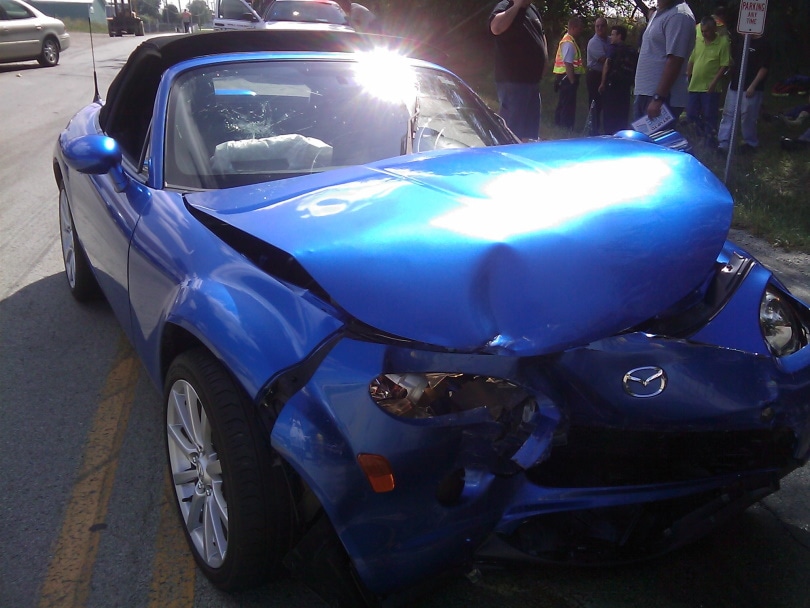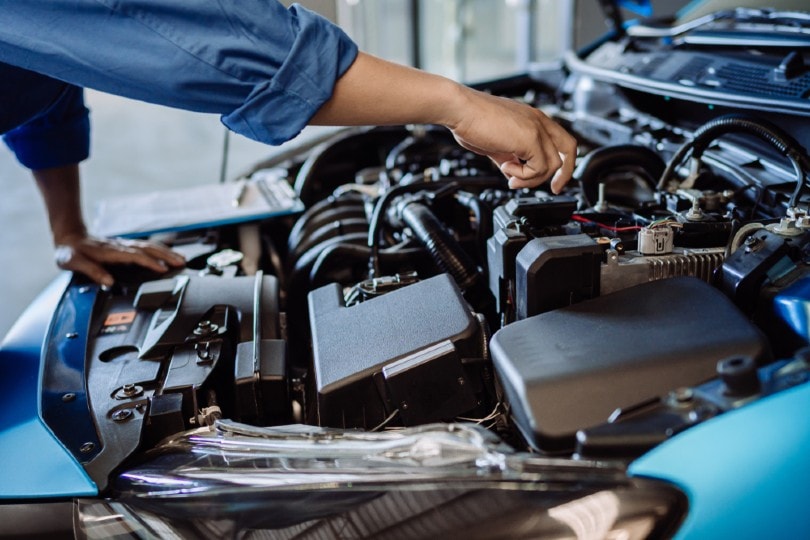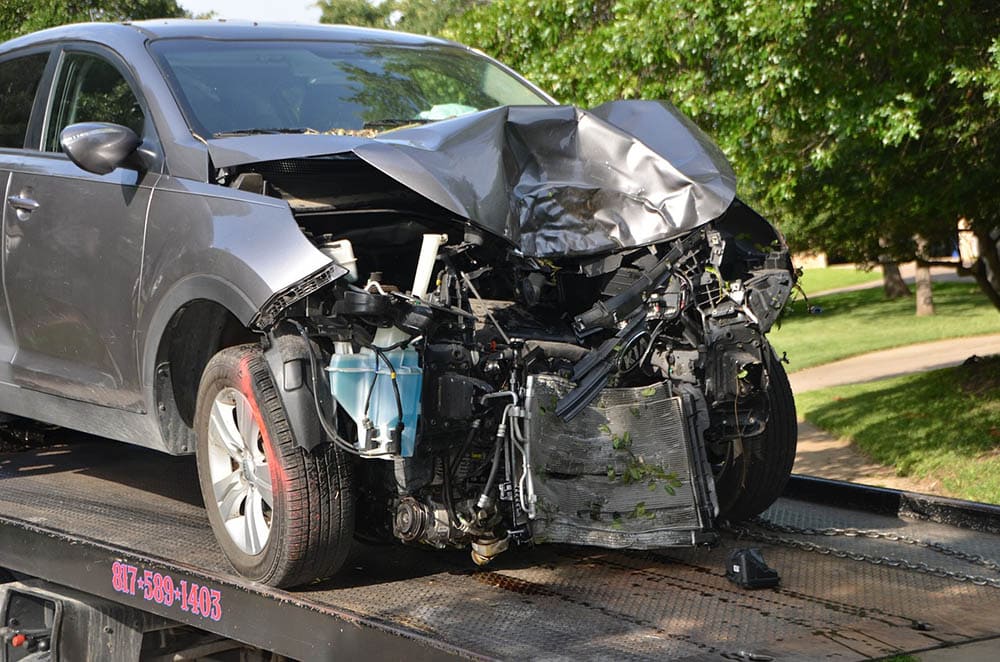Can You Drive A Car With A Salvage Title? What You Need To Know!
-

- Last updated:

Car accidents—it’s almost impossible to avoid them. Sometimes, the damage is minor; in other cases, it’s severe enough to call your four-wheeled friend a salvage title car. What does that term mean, though? And, more importantly, can you drive a vehicle with a salvage title in the US? The answer is no, in most states, it is illegal to drive a salvage car. Furthermore, salvage title cars can’t have insurance.
However, if you successfully refurbish the damaged automobile, you can apply for a rebuilt title. This way, the vehicle will be eligible for insurance and you’ll be able to properly register, drive, and even sell it. There are lots of pitfalls, though, which is exactly why we prepared this guide. Here, you’ll learn about the definition of salvage title cars, how to get them back on the road, and more.
What Is A Salvage Title Vehicle?
In North America (The United States and Canada), a salvage title is a form of branding for vehicles. Primarily, it applies to severely damaged cars. A vehicle can also be branded with a salvage title when it’s classified as a total loss by the insurance company that paid for the accident. An altered odometer is another reason to categorize a car as salvage.
With that said, the factors that define when a salvage title is applicable vary depending on the state and city. For example, in several Canadian provinces, stolen/vandalized cars automatically receive a salvage title tag unless they’re recovered by the authorities within three weeks. In such a scenario, the insurance company is obligated to pay off the original/previous owner. As for the States, a salvage title is issued to heavily damaged vehicles.

Why Are Titles Important? Can I Hit The Road Without One?
The answer is no, you’re not allowed to drive around in a car that doesn’t have a title. To drive a vehicle in the US legally, it must be registered. And for that, the car needs to have a proper title—branding that proves ownership. Let’s say you were in a traffic accident, and your car got damaged but can still run. From the government’s perspective, driving it will be against the law unless you get a proper title for it.
And, once it “sticks”, removing a salvage title is not an option. The only thing that you can do is repair it and get a rebuilt title. This is a very common practice in North America. You get a damaged car a salvage title then repair it, which allows you to apply for a rebuilt title. Do keep in mind, though, that when the damages go beyond 75% of the current market value, most insurance companies consider that a total loss.
This varies by state. In Oregon, the limit is 80%, while in Texas it goes as high as 100%. Again, it’s up to the insurance company to make this decision and title the vehicle salvaged or a total loss. So, how can you obtain a rebuilt title, exactly? And how much do reconstructed vehicles cost? Read on to find out!

How Do I Get A Rebuilt Title For A Car?
The moment a vehicle gets a salvage title, it’s shipped off to a salvage yard (yes, hence the name). There, it will be available for purchase. Or, you can have it repaired by professionals. Next, call in an inspection to evaluate the car’s condition. In certain states, you’ll have to deliver the automobile to an official inspection center. It will be a facility set up by the local police or the DMV (department of motor vehicles).
If the specialists are satisfied with the condition of the car, it will receive a rebuilt title. That will allow you to not only drive the car legally but also sell it. This is important: state-sanctioned inspectors only care about the legal side of things. They rarely check the safety of the vehicle. That’s why modern-day insurance companies don’t like to deal with salvage title cars, as it’s hard to figure out their fair value. Let’s talk about that next.

Can I Insure A Car With A Salvage Title?
It’s against the law to insure a vehicle with a salvage title. You could, of course, find a company that’s willing to insure such a car. That doesn’t mean it will pass an inspection from the authorities, though. Again, the best thing to do here is to refurbish the car and get a rebuilt title for it. The same is true for registering: you can’t do it legally unless you get a salvage title, repair the car, have it checked, and obtain a rebuilt title.
The necessary documentation for that differs from state to state. But expect the inspectors to request proof of ownership and a certificate of salvage. Receipt for parts and proof of repairs could also be requested. The best way to figure out the exact set of documents is to visit the DMV website of your state. For example, in some cities, the VINs are also checked.
Next, submit all the papers through that same site, and wait for an answer. If you did everything right, the state would issue a new title for that car (rebuilt vs. salvage). Only then can you register the vehicle, pay a small fee, insure it, and make it roadworthy again. So, can you insure a car with a salvage title? Yes, you can, but only after fixing it and getting a rebuilt title.

How Much Do Rebuilt Cars Cost?
The rebuilt title (or the reconditioned title) has a huge negative effect on the selling cost (value) of any vehicle, be it a family-friendly sedan or rough-tough SUV. On average, a rebuilt car will cost 20–40% less than one with a clean title. These are the estimates, though: when purchasing a salvaged or rebuilt vehicle, it’s always recommended to evaluate and appraise it personally.
The fair market value will depend on the extent of the damage, the car brand, its popularity, and other factors. Do keep in mind that most salvaged vehicles are paid for by cash because it’s pretty hard to find a company that will agree to finance a car that’s difficult to assess (especially if it was title washed)
Are Salvage Title Cars Worth It?
From a buyer’s perspective, yes, they can be a worthy investment. As mentioned, salvage title vehicles are significantly cheaper than “clean” cars. That instantly makes them an attractive deal for people on a low budget, investors, and car enthusiasts. Besides, in many cases, insurance companies apply salvage titles to vehicles with (relatively) minor damages.
For example, the car’s finish might be severely damaged, but the mechanical parts like the engine or transmission could be left intact. These can be fixed quickly and easily and with minimal financial investments. On the other hand, the market is overcrowded with automobiles that are only good for scrap. Unless you’re a seasoned pro, it will be very hard to see the difference between a vehicle with a salvage title and a junk/total loss.

The thing is—the repair history of any vehicle tends to get lost or erased when it’s transported from one state to another. Color designations might help here. In the US, a blue title stands for salvage, while orange indicates a rebuilt title. Green, in turn, is for clean (that means the car is legally allowed to drive and has never been salvaged, rebuilt, or totaled).
Salvage vs. Totaled Cars – What’s The Difference?
These terms are often used interchangeably, especially by novices. Many people believe that “salvaged” means the vehicle is beyond repairs and doesn’t hold any value, but that’s not true. A salvage title vehicle can be “brought back to life”. All you’ll need to do is repair it. Sometimes, the damages aren’t at all substantial. Usually, it’s the insurance company that gives vehicles this title.
In contrast, “total loss” is not a title brand. It’s just an indication that the car is unsafe to drive; therefore, it needs to be stripped of its parts and be crushed for recycling for scrap metal. No matter how much effort (and money) you put in it, a totaled car won’t be able to get back on the road.

The Pros and Cons Of Salvage Title Cars
Before we wrap this up, let’s take a quick look at the advantages and disadvantages of buying a vehicle with a salvage title:
- You can save a fortune on salvage title cars. Sometimes, they are sold for a fraction of the real market value.
- Lots of spare parts. If you get lucky, a salvaged car will have lots of useful (and often quite expensive) spare parts.
- A chance to “win the lottery”. Now and then, a salvaged vehicle comes around that looks and drives like a brand-new ride. This is your chance to score big.
- Low resale value. A car with a salvage title is very difficult to sell. Even after you refurbish it, you might have to wait for a while for a buyer to come around.
- Problems with insurance. Most insurance companies won’t agree to cover a salvaged automobile. Besides, if you get in a new accident, you’ll have to pay a large amount.
- Hidden issues. The longer you drive a salvaged vehicle, the more of its “wounds” will be revealed. That equals expensive repairs and hefty maintenance.
Conclusion
Salvage title cars are very common in the US. People buy and sell them all the time. However, you need to be very careful when investing in such a vehicle. First, it’s against the law to drive a car with a salvage title in the United States. Second, rebuilding it and finding a proper insurance company can be challenging.
So, if you’ve been in an accident or just decided to invest in a salvaged vehicle, always check in with local laws and regulations to stay out of trouble. Today, we talked about the definition of different titles, how to refurbish a car with a salvage title, get insurance coverage, and whether that’ll be worth the effort or not. Drive safely, and we’ll see you next time!
Featured Image Credit: Gorlov-KV, Shutterstock
Contents

